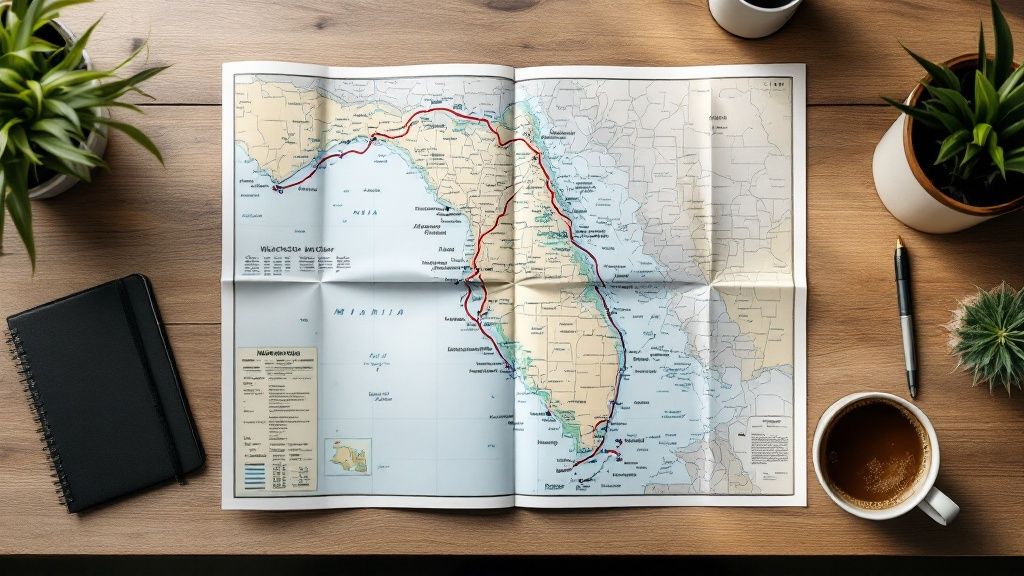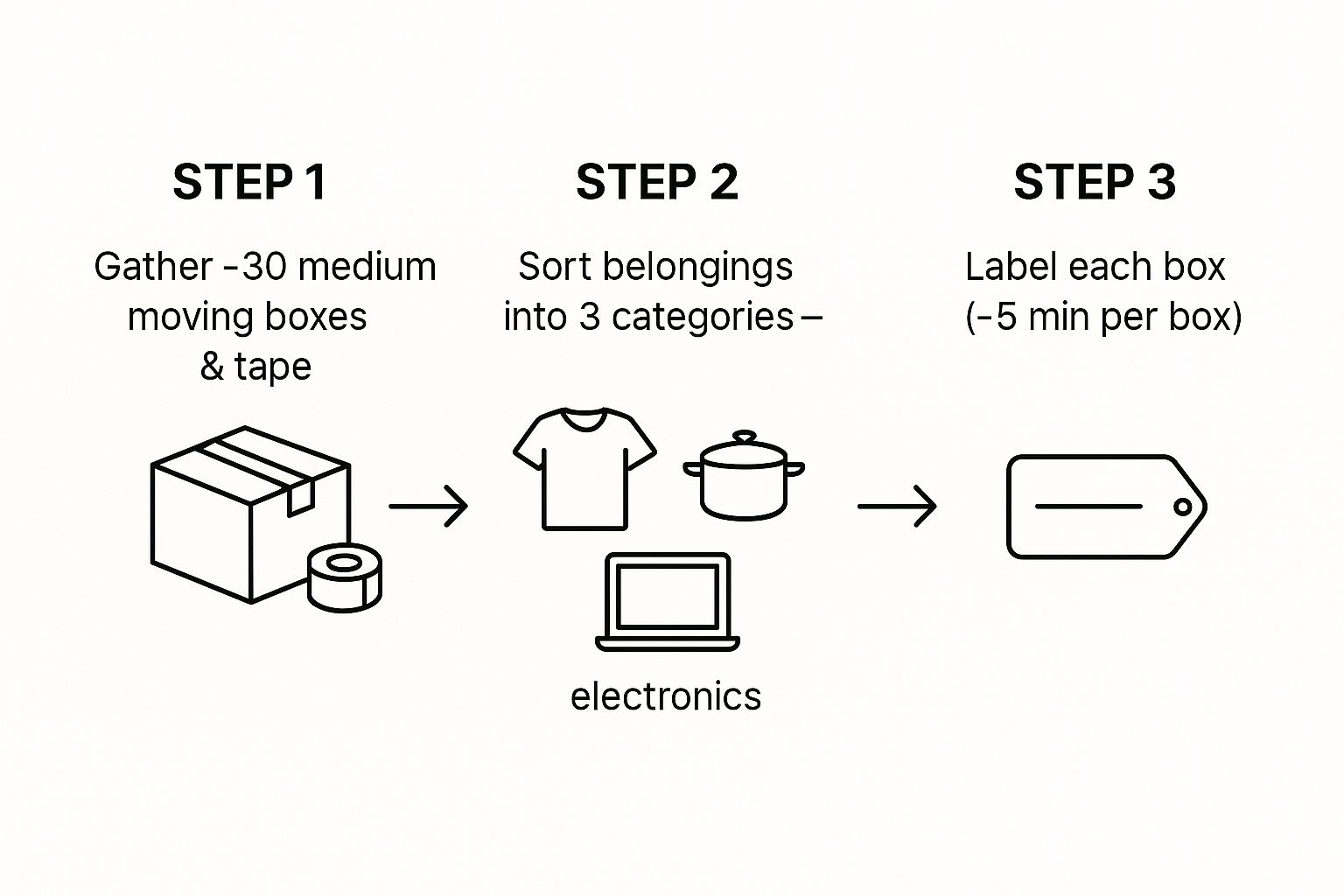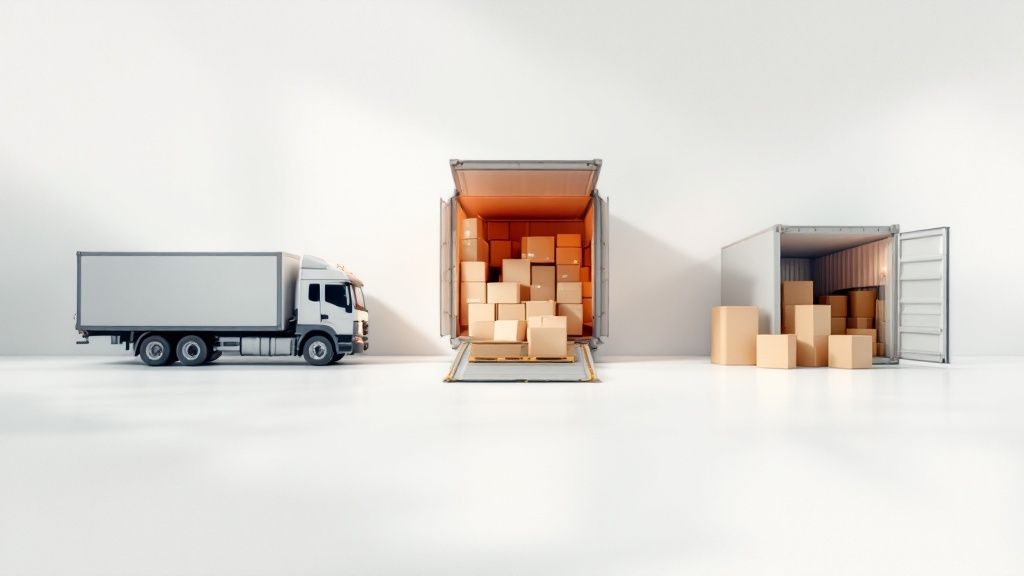Swapping Miami’s sun-drenched beaches for Washington's evergreen forests is a huge adventure, but it also means planning a 3,300-mile journey. Figuring out the best way to move your life from one corner of the country to the other is all about finding that sweet spot between your budget, your timeline, and your sanity.
For a move this significant, many people find that partnering with a professional mover like Direct Relocation Services offers the perfect blend of cost-effectiveness and reliability.
What's the Best Way to Move From Miami to Washington?

A cross-country move of this scale really boils down to two main paths: hiring professionals or taking the DIY route. It's no surprise that full-service moves account for a significant share of intricate cross-country relocations, especially when you have a lot of stuff or fragile items that need expert handling.
Your main options typically include:
- Full-Service Movers: This is the most hands-off approach. A professional crew from a company like Direct Relocation Services handles everything from packing your dishes to loading the truck and driving it safely across the country.
- DIY Truck Rental: Renting a truck can definitely save you money, but it puts all the physical work and logistical stress squarely on your shoulders.
- Moving Containers: This is a nice middle ground. A company drops off a container, you pack it at your own pace, and they handle the transportation.
For most families making the trek from Florida, Direct Relocation Services can manage the entire process, giving you a clear quote, professional packing, and a team you can rely on from start to finish.
Comparing Your Miami to Washington Moving Options
Here’s a quick breakdown of the main ways to get your belongings across the country, highlighting the trade-offs between cost, effort, and security.
| Moving Method | Average Cost Range | Effort Required | Best For |
|---|---|---|---|
| Full-Service Movers | $8,000–$15,000 | Low | People with fragile items, large households, or those who want a stress-free experience. |
| DIY Truck Rental | $3,000–$6,000 | High | Budget-conscious movers who don't mind the heavy lifting and long-distance driving. |
| Container Shipping | $4,500–$8,000 | Medium | Those who need flexible packing/unpacking timelines and prefer not to drive a large truck. |
Ultimately, the right choice depends entirely on your personal circumstances, budget, and how much you're willing to take on yourself.
As you get into the nitty-gritty of planning, you'll also need a strategy for your current home. You might find these expert tips on selling your house fast when moving out of state incredibly helpful.
And to keep all the moving parts straight, a solid checklist is non-negotiable. Grab our guide at https://www.directrelocationservices.com/the-ultimate-residential-moving-checklist/ to make sure nothing falls through the cracks, from decluttering in Miami to settling into your new Washington home.
Investing in professional long-distance moving services reduces the risk of damage and saves an incredible amount of time compared to a DIY trek.
Why Go with the Pros?
Working with an experienced moving company brings some key advantages to the table, especially for a long-haul move.
- Peace of mind: Professionals are trained to handle fragile, bulky, and high-value items with care.
- Transparent pricing: A good quote should clearly outline all costs, including packing, loading, transport, and insurance.
- End-to-end support: You'll have a dedicated point of contact to guide you from the initial planning phase right through to the final box being unpacked.
The best first step is to request a free quote from Direct Relocation Services. This allows you to understand the costs and secure your moving dates well in advance. Following a clear plan from the beginning will ensure you find the best way to move from Miami to Washington State for you.
Creating Your Cross-Country Relocation Timeline
Moving from Miami to Washington State doesn’t have to feel like juggling flaming torches. Give yourself 8 to 12 weeks to break the process into manageable chunks rather than scrambling at the last minute. With a clear timeline and deliberate steps, you’ll trade panic for confidence.
Begin by tackling one room at a time. As you sort through your Florida home, every item you sell, donate, or toss lightens your load—and your final bill. Meanwhile, dive into research on your future Washington neighborhood: scout out schools, healthcare providers, and local hotspots so you’re not starting from scratch.
Building Your Home Inventory
A thorough inventory isn’t optional—it’s your moving-day GPS. Documenting everything from sofas to salt shakers guarantees accurate quotes from Direct Relocation Services and makes insurance claims painless.
- Note each item’s condition and approximate size
- Snap photos with an inventory app for easy verification
- Tag boxes clearly to speed up unpacking
Pro Tip: Create a digital “Move Folder” in Google Drive (or your favorite cloud service). Store photos of your inventory, copies of contracts, receipts, and important documents. Being able to pull up that folder on your phone will save you precious time and sanity.
The Weeks Leading Up To Your Move
When you hit the home stretch, shift gears from big-picture planning to hands-on tasks. A simple table can keep priorities front and center:
| Timeframe | Key Actions |
|---|---|
| 4–6 Weeks Out | Gather packing supplies, schedule utility transfers, book vet visits for pets |
| 2–4 Weeks Out | Pack out-of-season clothes and books, submit change-of-address, update banks and services |
| 1 Week Out | Finish packing essentials, defrost the fridge, confirm with movers, assemble a “first-night” box |
For a deeper dive into packing strategies and timelines, check out our detailed long-distance moving packing guide.

Visual aids can turn a mountain of boxes into a clear sequence of steps—collect supplies first, then sort, label, and load. Before you know it, you’ll be unpacking in your new Washington home instead of stressing over logistics.
How to Budget for Your Pacific Northwest Move

Let's talk numbers. When you're planning a move from Miami all the way to Washington State, the quote from your moving company is really just the starting point. To avoid any financial surprises, you need to think about the entire picture—from the gas station coffee on that cross-country drive to the first time you stock your new fridge.
Putting together a solid financial roadmap is the best way to tackle this move with confidence. It’s a 3,300-mile journey, and believe me, the little things add up fast.
Beyond the Moving Truck Quote
The biggest line item on your budget will almost certainly be the professional movers. When you get a quote from Direct Relocation Services, know that the final price depends on a few key things. The total weight of everything you're shipping is the biggest factor, which is why decluttering your Miami home before you pack is one of the smartest things you can do.
The timing of your move matters, too. Moving during the off-season, which is roughly September through April, can often save you a good chunk of change compared to a peak-season summer move.
Beyond that main fee, you’ll want to budget for a few other potential moving-day costs:
- Packing Services: You can definitely pack yourself, but having professionals do it saves an incredible amount of time and stress, especially with fragile items.
- Storage: Is your new place in Washington ready the second the truck arrives? If not, you'll need to factor in the cost of temporary storage.
- Valuation Coverage: Basic liability is included, but upgrading to full value protection is a smart move for peace of mind. It's an investment in your belongings.
The secret to a smooth move from Miami to Washington State is having an honest, realistic budget from day one. Keeping track of where your money is going eliminates a ton of stress and frees you up to focus on settling into your new home.
A detailed cost breakdown can make planning much easier. Here's a look at what you might expect to spend on a cross-country move.
Estimated Cost Breakdown for a Miami to Washington Move
This table provides a detailed look at the potential expenses involved in a cross-country relocation to help with accurate financial planning.
| Expense Category | Estimated Cost Range | Notes & Tips |
|---|---|---|
| Professional Movers | $4,500 – $9,000+ | Full-service movers like Direct Relocation Services. Cost varies based on weight, distance, and time of year. |
| DIY Truck Rental | $2,500 – $5,000 | Includes truck rental, fuel, and insurance. Doesn't include your time or the physical labor involved. |
| Packing Supplies | $200 – $600 | Boxes, tape, bubble wrap, and markers. You can often find free boxes at local stores to cut down on this cost. |
| Travel Expenses | $800 – $2,000 | Covers fuel for your car, 4-6 nights in hotels, and food along the way. This can vary a lot based on your travel style. |
| Temporary Housing | $500 – $1,500 | If your new home isn't ready, you'll need a hotel or short-term rental for a week or two. |
| Vehicle Shipping | $1,200 – $1,800 | If you're flying and not driving, this is the cost to ship one standard vehicle. |
| Setup & Utility Fees | $300 – $700 | Deposits for electricity, water, internet, and gas. Also includes new driver's license fees and vehicle registration. |
| Contingency Fund | 10% of Total Budget | Your "just in case" fund. Unexpected things always happen during a big move, from a flat tire to needing to replace something that broke in transit. Don't skip this! |
Remember, these are just estimates. Your actual costs will depend entirely on your specific situation, how much stuff you have, and the choices you make along the way.
Accounting for Hidden and Travel Expenses
Okay, so you've got the movers handled. Now it's time to think about the other side of the move: getting yourself from Florida to Washington. These are the "hidden" costs that can easily sneak up on you if you're not prepared. For example, depending on your vehicle situation, looking into one-way car rental services can sometimes be a simpler and more budget-friendly option than putting thousands of miles on your own car.
Don't forget to account for these common expenses:
- Transportation: This isn't just fuel. It's the cost of hotels, meals, and any flights you might need to book.
- Temporary Housing: That gap between your Miami move-out and your Washington move-in can be costly if you need a hotel for several nights.
- Setup Costs: Think about the immediate expenses once you land in Washington. You'll have utility deposits, fees for a new driver's license, and that first big grocery run to stock an empty pantry.
People move for all sorts of financial reasons. Some are fleeing a high cost of living, while others are chasing better job opportunities or lower taxes. You'll see a huge range in what people spend; some families might invest $10,000–$15,000 for a complete, hands-off moving experience with Direct Relocation Services, while many others go the DIY route to keep their total costs in the $3,000 to $6,000 range.
Choosing the Right Professional Moving Partner
For a long-haul move from Florida, the single biggest decision you’ll make is picking the right moving company. Let's be honest, trying to drive a giant rental truck yourself across 3,300 miles of unfamiliar terrain—including the Rocky Mountains—is a recipe for a logistical nightmare. This is exactly why a dedicated, experienced partner is non-negotiable for a smooth relocation.
The right company isn’t just about muscle; it's about turning a stressful ordeal into a completely managed process. You're entrusting your entire life's possessions to a team that specializes in exactly these kinds of cross-country journeys. With a partner like Direct Relocation Services, you get a team that genuinely understands the specific challenges of a Florida-to-Washington move.
What to Expect from a Full-Service Move
A top-tier moving service should handle every single detail, leaving you free to focus on the exciting parts of starting your new life in Washington. From the first phone call to the last box being placed in your new home, the whole process should be designed for your peace of mind.
Here are the key services you should absolutely look for:
- Expert Packing: Professionals use the right materials to protect everything, from delicate glassware to your heaviest furniture, making sure it all arrives in one piece.
- Secure Transport: You want licensed and insured drivers navigating that long journey. This gives you the confidence that your belongings are in safe hands from start to finish.
- Transparent Quotes: You must receive a clear, itemized quote with no hidden fees. This is crucial for budgeting accurately from the very beginning.
The real value of a full-service move isn't just about convenience. It’s the security of knowing that experts are handling every physical aspect of the move, which lets you manage the personal side of your relocation without all the added stress.
Understanding the paperwork is also incredibly important. When you get your bill of lading—which is the legal contract between you and the mover—read it carefully. This document outlines the services, delivery dates, and the total cost. Knowing your rights and what’s in your contract is a huge part of making a smart choice. For a more detailed breakdown, our guide offers valuable insights on how to choose the right moving company.
Why an Experienced Partner Matters
Washington State has become a magnet for people moving from other states, especially Florida. As the population grows, more and more families are opting for full-service movers for these massive 3,000+ mile transitions.
We're seeing a popular hybrid approach: families fly to their new home while professionals handle the heavy lifting and transport their possessions by truck. It's the most efficient and least stressful way to manage such a huge move.
This is where a specialist shines. By focusing on long-distance moves originating from Florida or Georgia, a company like Direct Relocation Services has mastered the unique logistics of this specific cross-country route. They know the journey inside and out and are equipped to provide a seamless experience, from Miami's sunny coast all the way to the mountains of the Pacific Northwest.
How to Settle Into Your New Washington Home

The truck is here, and your long haul from Florida is finally over. This is it—the beginning of your new life in Washington. Those first few days are all about transforming a house full of boxes into a home and knocking out the essential paperwork that officially plants your roots in the Pacific Northwest.
As the Direct Relocation Services crew starts unloading, it's time to put on your supervisor hat. Keep your inventory list handy and check off items as they come off the truck. This is your prime opportunity to spot any damage that might have happened during the journey. A little direction goes a long way here; have the crew bring in the kitchen, bedroom, and bathroom boxes first. Trust me, you'll thank yourself when you can make a cup of coffee, take a hot shower, and fall into your own bed without an epic box-excavation project.
Your First-Week Game Plan
With the moving truck gone, the next phase begins. Getting the administrative stuff out of the way is just as critical as unpacking the dishes. A simple checklist can be a lifesaver, keeping you from missing important deadlines in the whirlwind of settling in.
-
Get Official with the DOL: You have 30 days to get a Washington driver's license and register your vehicle after you move. The Department of Licensing (DOL) can have long waits, so book an appointment as soon as you can.
-
Sort Out Healthcare: Your old Florida health insurance probably isn't going to cut it here. Start researching local doctors and dentists who are in-network with your new plan and get those initial appointments on the books.
-
Handle School Registration: If you're moving with kids, get their school enrollment finalized. You'll likely need proof of residency (like a lease or a utility bill), so make sure you know where those documents are.
The key to a smooth transition is to handle the official business quickly. Getting your license, healthcare, and schooling sorted within the first week or two will help you feel more grounded and officially part of your new community.
Making the Pacific Northwest Your Own
Trading Miami for Washington is a huge shift, and not just geographically. The culture, the climate, the whole vibe is different. Give yourself grace and time to adjust. Yes, the weather is a big one—you'll want to embrace layers and get a quality waterproof jacket. You'll also find the coffee obsession is very real; finding your go-to local café is practically a rite of passage for every new resident.
Most importantly, get out and explore what makes this state incredible. The access to nature is second to none. Check out a nearby hiking trail, wander through a local farmers market, or plan a weekend getaway to the mountains or the coast. This is how you stop just living in Washington and start truly calling it home.
Your Top Questions About Moving From Miami to Washington
A cross-country move from Florida to Washington State is a huge undertaking, so it's only natural to have a lot of questions. We get it. Here are some of the most common things people ask us, with straightforward answers to help you get a better handle on your upcoming move.
How Long Does a Move From Miami to Washington State Actually Take?
It’s a long haul, so don’t expect your stuff to arrive overnight. The entire process—from the moment our crew starts loading in Miami to the last box landing in your new Washington home—usually takes between 7 and 21 days.
Now, the actual drive itself might only take a week or so. But that bigger window gives us the time needed for all the logistics that happen behind the scenes: careful loading, route coordination, and making sure everything is unloaded safely. Things like the time of year, how much stuff you have, and even weather can shift that timeline. That's why at Direct Relocation Services, we always give you a guaranteed delivery window in writing. You’ll know exactly when to expect us.
A trip over 3,300 miles needs precision. Your movers should give you a clear delivery window, not just a guess. This is what allows you to confidently book your own flights or plan your drive without worrying if you'll be sleeping on the floor for a week.
When Is the Cheapest Time of Year to Move?
If your budget is the biggest factor, try to move during the off-season. In the moving world, that generally means anytime from September through April. Demand is way lower during the fall, winter, and early spring, which usually means better prices and more open dates on the calendar.
The one thing to keep in mind is the weather, especially when crossing mountains in the winter. The peak season, May through August, has better weather but everyone wants to move then, so prices are higher. If you're stuck with a summer move, the best thing you can do is book with us as far in advance as you can. It helps lock in a better rate and secures your spot.
Do I Really Need to Buy Extra Moving Insurance?
Honestly? Yes, you almost certainly do. Federal law requires all movers to provide a basic, no-cost option called Released Value Protection. The problem is, it’s incredibly minimal. It covers your belongings at just $0.60 per pound.
Think about it this way: if your 50-pound flat-screen TV gets damaged, you'd only get $30 back. That’s barely enough for a pizza night, let alone a new TV.
For a move this big, that's just not enough protection. At Direct Relocation Services, we always recommend upgrading to Full Value Protection. It costs a bit more, but it means if something is lost or damaged, the moving company has to either repair it, replace it with a new one, or give you a cash settlement for its current value. It’s an investment in your peace of mind.
What’s the Best Way to Prepare My Stuff for a Cross-Country Move?
Good preparation is half the battle. The absolute best thing you can do first is to get rid of stuff you don’t need. Seriously. Go through every room in your Miami home and be ruthless. Every item you sell, donate, or toss is one less thing to pay to move across the country.
After you've downsized, what comes next depends on who's doing the packing.
- If We’re Packing for You: Your main job is just to sort. Make clear piles of what’s going and what’s being donated. Point out anything super fragile or valuable so we can give it special attention.
- If You’re Packing Yourself: Don't cheap out on boxes—get sturdy ones. Label every single box with what's inside and which room it belongs in at your new place (e.g., "Kitchen – Silverware" or "Master Bedroom – Sheets"). Future you will be so grateful.
And here’s the most important tip of all: pack a "first night" box. This is the box that travels with you in your car. Fill it with essentials—toiletries, phone chargers, a toolkit, medication, a couple of plates, and clean bedding. Having that box handy will make your first 24 hours in Washington a million times easier.
Ready to make your move from Florida to the Pacific Northwest a smooth one? The team at Direct Relocation Services is here to handle all the details, from packing up in Miami to safely delivering everything to your new home in Washington. Get your free, no-obligation quote today and let’s start planning your journey with confidence.
